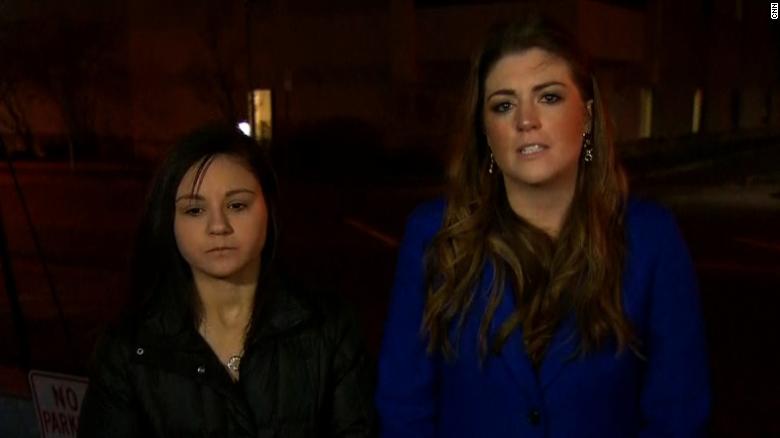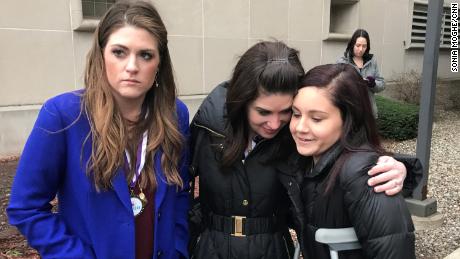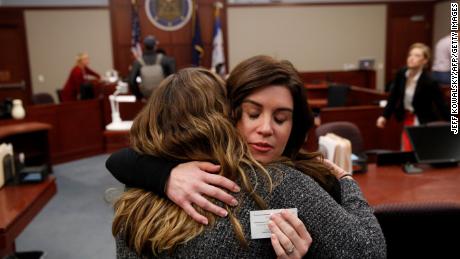Story highlights
- Women abused by Larry Nassar says their sisterhood is giving them new strength
- Survivor: "These women, these warriors, give me life. They lit a fire inside me that I never knew existed"
Lansing, Michigan (CNN)It's the night before the three young women will come face to face with the man who repeatedly sexually assaulted them, and they are having dinner together.
Kaylee Lorincz, Sterling Riethman and Rachael Denhollander live hours apart and are at different phases in their lives, but one thing bonds them.
They are the last victims -- they prefer the term "survivors" -- to speak at the sentencing of Larry Nassar, the former doctor for the US national gymnastics team.
The young women have spent nearly every moment together here during the sentencing hearing, which was initially meant to take four days but has lasted for seven. They laugh, group text and share Facebook messages.
They are members of a group nobody wants to be part of. Yet their sisterhood is giving them new strength.
And before Nassar's sentencing was over, they had turned into an army.
As Riethman took the podium in court Wednesday, she said Nassar's actions will leave her and many other young women trying to repair their broken selves for the rest of their lives. But they will do it together, she said.
"I look around this room and I am in complete awe," Riethman said. "These women, these warriors, give me life. They lit a fire inside me that I never knew existed. They inspire me and fuel me to continue on in this fight against predators and enablers."
"We were ultimately strong enough to take you down," Lorincz said Wednesday, directing her comments at Nassar in the courtroom.
"Not one by one, but by an army of survivors."
An unspoken understanding
Many of Nassar's victims were gymnasts -- a sisterhood in itself. They'd spend 20 hours a week or more in grueling practices that gave them agonizing injuries.
Lorincz, 18, was once one of those girls who spent most of her time at her gym. She knows many other girls who were treated by Nassar.
"It was never talked about, what Larry had done to us," she told CNN.
As gymnasts, they were taught to fight through their injuries, be disciplined, emotionless. Many also applied this mindset to deal with what Nassar did to them on the exam table -- sometimes while their parents were in the same room.
Riethman, 25, a former gymnast, was one of the first to speak out. She went public last year about the abuse she suffered and now marvels at the group of women who have since joined her.
"I saw a lot of this coming together just through being in court together, doing press conferences together -- that bonds you," Riethman told CNN. "You're going through this experience that you never thought you'd have to go through. You start to realize, like, 'Oh, we have a lot more in common than I thought we did.'"
Riethman and Lorincz are part of a smaller group of about five other survivors who text each other every day. They don't necessarily talk about the trial. But they share an unspoken understanding.
"These girls are so supportive. And we can relate on something that isn't an ideal situation to be able to relate to," Lorincz said. "It's so nice to have these girls to be able to go to because you trust them immediately. Nobody has been able to understand the feeling of going through this, other than these women."
Nassar's victims form strong bonds because sexual abuse is such an isolating event, said Erin Roberts, executive director of End Violent Encounters, a Michigan-based nonprofit that serves victims of sexual assault.
"When survivors are speaking out, they are hearing others and more are coming forward," Roberts said. "There is a healing power in groups. They find solace in each other's words, they find similarities in their stories between each other."
'We'll always need each other'
Kyle Stephens, 26, was the first survivor to step to the podium and speak her truth last week at Nassar's sentencing. She looked Nassar in the eye and began describing to the judge what he did to her in the basement of her parents' home when she was still in kindergarten.
Unlike his other victims, she was not an athlete, she was not seeking medical treatment. He simply gained the trust of her parents and assaulted her, she says. She never told anyone about what happened until nearly a decade later.
"Little girls don't stay little forever," Stephens told Nassar in court. "They turn into strong women who return to destroy your world."
Nassar couldn't look at her.
"That was even more empowering," Stephens recalled a few days later. "I just realized that, now, I have the upper hand in this relationship."
The morning Stephens spoke, the courtroom was quiet. But by mid-week, the audience -- mostly victims of Nassar -- erupted in applause after each statement.
In all, 169 impact statements were read, including 156 from victims themselves.
Stephens now lives in Chicago and works as an engineer for AT&T. But she stays in touch with some of the other women who spoke publicly about being assaulted by Nassar.
They mostly text. Whether they're talking about the case or just day-to-day-things, the sisterhood they have formed has helped them heal, Stephens said.
"We're all at different places in our process," she said. "I don't know if this process ever really ends. We'll always need each other."







